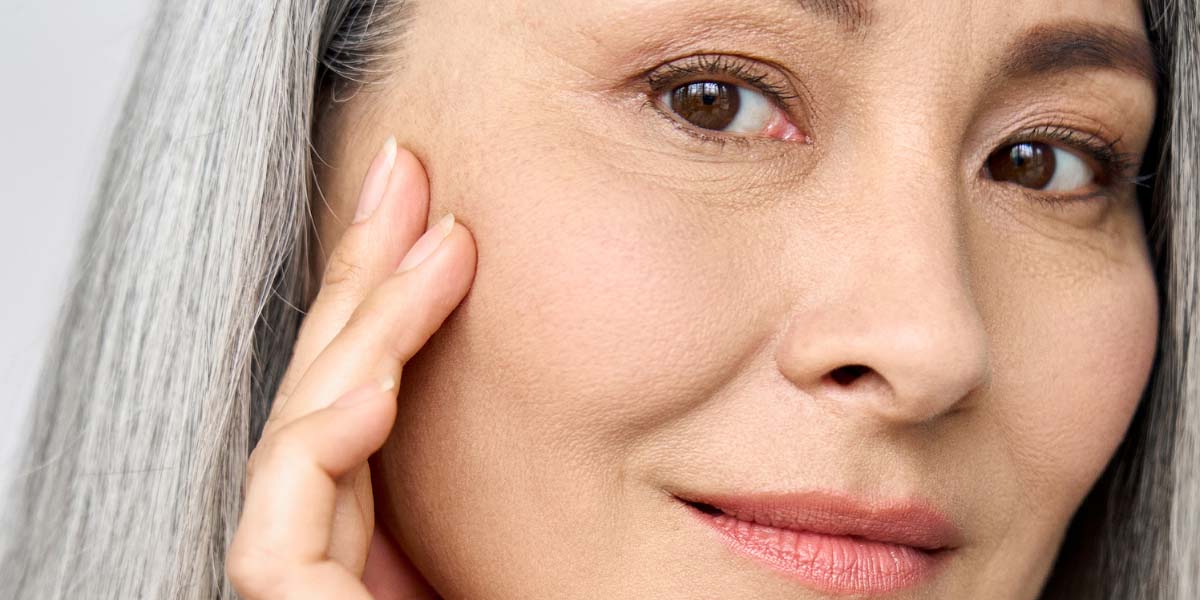Our skin is constantly changing. From the delicate skin of a new-born, through to adolescence where some people can experience acne, to midlife where hormone changes can cause adult acne, and then onwards to our mature years, our skin will inevitably go through its natural ageing process. Over time we will all get visible lines, our skin will lose elasticity and reduced collagen levels. It is natural for our face to lose some of its youthful fullness and as we age we notice our skin becoming thinner and drier.
Choosing the right products that will care for, nourish and protect your skin, through all stages of these changes is key to achieving your best skin that looks and feels healthy, no matter what your age is.
We have put together a skin timeline to show you what to expect as you age and products we recommend you incorporate into your routine.

What to Expect With Your Skin in Your:
20s
In your early 20s your hormones can still fluctuate. While breakouts can continue to occur from your teens they are typically less severe. During this period collagen production is in its prime, this is where your skin appears plump, bouncier and has more glow.
However when you reach your mid 20s your skin cell turnover starts to slow down. This causes dead skin cells to build up and cause discoloration. It can also cause loss of skin elasticity. When skin starts to thin, its barrier function and its natural protection against UV also gradually reduce.
Collagen mass and flexibility also begin to deplete at a rate of approximately 1% a year from the age of 25.
Top 3 Essential steps to care for your skin in your 20s
Cleanse
Ensure you find the right cleanser for your skin type and get into a daily habit of cleansing your skin. Avoid harsh cleansers with drying astringents as this may cause irritation and breakouts. Instead opt for a gentle cleanser that balances your skins natural pH levels. Our [BALANCE] Ultra Gentle Soothing Cleanser will gently clean your skin without stripping away your natural oils.
Never sleep with your makeup on
This is a no-brainer, but I repeat for the people in the back "Never sleep with your makeup on!!"
Be sun smart
This is a biggie... wear an SPF every. single. day! Start now.
It’s essential to protect our skin at all times of the year because sun exposure is always present, regardless of the season, and contributes to premature skin ageing. Our [HYDRAPROTECT] Pro+ Bio Soothing Day Mineral CC SPF15 is a lightweight, non-greasy physical SPF, which is perfect for every day use.
30s
Your 30’s is when your skin starts to reflect ‘adult life’, this is where the fine lines become more prominent around the eyes and around the mouth. You may also start to see forehead and frown lines begin occurring. Volume will decrease around the lips, cheeks and under the eyes. Your complexion may start to look more dull.
For women, hormones are one of the largest contributors to skin changes in your 30s. In your late teens growth hormone levels are around 900, when you hit your 30s the level drops to around 200. When female hormone levels begin to decrease, skin concerns associated with ageing become more obvious.
Now is the time to start fine-tuning your skincare routine. Establishing a routine that includes hydrating ingredients like glycerin and hyaluronic acid, along with excellent sun protection (that you've continued to use through your 20s). Once you have that down pat, you should also add in an antioxidant serum that can address the free-radical damage involved in premature ageing. Retinoids should also be introduced into your routine.
Top 3 Essential steps to care for your skin in your 30's
Exfoliate
Now is the time to really amp up your exfoliation regime, you need to be focusing on boosting cell turnover to keep your skin looking fresh and bright. Our [EXFOLIATE] is a gentle leave on exfoliating lotion containing 10% glycolic acid (AHA) and antioxidants to help calm redness and improve skin’s texture.
Beauty sleep
Our body’s blood circulation is boosted during sleep, bringing nutrients and oxygen to skin cells. When we don’t get enough sleep, cortisol levels can rise and our skin becomes inflamed and stressed. Try for at least 8 hours of sleep a night.
TIP: Treat yourself to a good satin or silk pillowcase. They help diminish the appearance of fine lines, smooth hair and will absorb less moisture from your skin than a cotton pillowcase.
Vitamin C
Age spots in your 30's is very common. Vitamin C helps reduce pigmentation spots and brightens the skin. Vitamin C is a potent antioxidant which protects the skin from oxidative stress generated internally from metabolism and externally from pollution and UV rays.
Our [REPAIR] Pro+ Vitamin C Hyaluronic serum should be on the vanity shelves of every 30+ person.

40s
In your 40s you will continue to experience hormone changes. Oestrogen levels fall at menopause. This is a natural transition for all women between ages 40 and 55 and will cause some noticeable skin changes. You may begin to experience skin dryness, loss of structure, deeper wrinkles, more age spots and experience sudden redness as a result of broken capillaries.
Many people can fall into the trap of trying too many different products to combat the signs of ageing, but this is where we urge you to keep things simple but add in a few extra's into your current routine.
Top 3 Essential steps to care for your skin in your 40's
Retinols
Vitamin A is a powerful multitasker, able to reverse sun damage, stimulate collagen production, soften wrinkles, retexturize the surface of the skin, and even out pigmentation. We have 2 retinols in our range, [SUPERFOLIATE] RX serum & [SUPERADIANCE] Alt serum - which is our pregnancy safe retinol made from Bakuchiol.
Healthy lifestyle habits
Keeping well hydrated, eating a well balanced diet and incorporating moderate exercise is key for the overall health of your skin. Drinking 2-3 litres of water a day, eating as many foods of the rainbow and getting your heart pumping and body moving will ensure your feeding your skin from the inside-out.
Keep your skin moisturised
Keeping your skin well moisturised is essential as our skin ages. The skin’s natural ability to produce lipids decreases which, along with the continued decline in Hyaluronic Acid and collagen production, results in dryness, dehydration and deep wrinkles.
Our [HYDRATE] Soothing Emulsion is a lightweight cationic moisturiser containing probiotic, ceramides, hyaluronic acid and emollients to help nourish the skin and protect it from free radical damage.

Many people begin to find themselves dealing with crepey skin for the first time in their 50s. Crepey skin is when the skin both thins and wrinkles simultaneously. This will leave your skin looking looser than before. You will notice changes such as less radiant skin, wrinkles continue to become deeper and more abundant, you may notice more prominent facial hair, your skin may become more sensitive and the risk of developing skin tags increases.
In your 60s and beyond your epidermis and dermis layer begin to further thin and flatten out. Your skin become more drier with wrinkles, age spots and creases become even more noticeable. You may notice your skin is more fragile, and you may have an increasing number of age spots. You will notice a larger spike in skin tags and may develop dilated superficial blood vessels (telangiectasias) on the cheeks, nose, chin, and legs.
Top 3 Essential steps to care for your skin in your 50's and beyond
Easy does it
Your skin-care regime shouldn’t change too much from previous years. Hydrating, firming, and keeping discoloration at bay are still your major focus. However, many people find that their skin becomes more sensitive after 60. This may be the result of the skin's barrier function becoming less effective as your skin naturally becomes thinner and drier. So you may have to pullback your exfoliating regime. (For example, use your retinoid or glycolic acid every other night rather than daily.) Also, choose an antioxidant product that calms inflamed skin. Our [RESCUE] Probiotic + DS Soothing serum is a deeply restorative formula which cools and helps soothe irritated skin and calm redness. The copper and zinc gluconates help to limit the spread of harmful bacteria and replenish the skin barrier.
Facial massage
A daily facial massage does wonders for the skin at any age, but is especially beneficial for mature complexions. It helps improve blood flow, reduce fluid build up, works to sculpt the facial muscles, cell turnover, tissue toning, and boost collagen production.
TIP: Indulge in weekly face masks for an added moisture boost and delivery of extra skin-loving goodness.
Embrace the beautiful skin you're in

At AMPERNA® we believe It is never too early or too late to begin looking after your skin. If you are looking to discuss your skin concerns and develop a tailored regime to suit your skin needs you can get in touch with our founder Kiri today.
Sources:
https://www.healthline.com/health/beauty-skin-care/anti-aging-skin-tips#60-s-and-beyond
https://www.aarp.org/health/healthy-living/info-09-2012/what-to-expect-in-your-60s.html



















